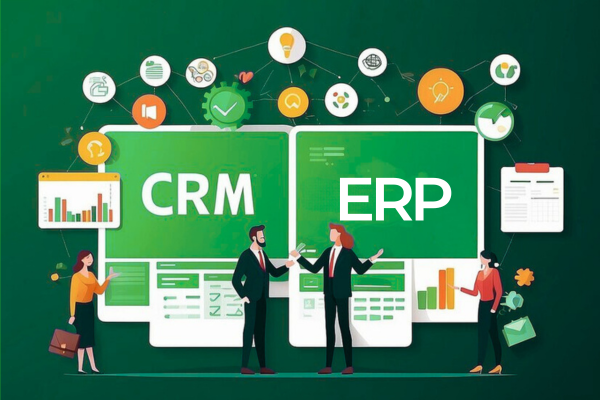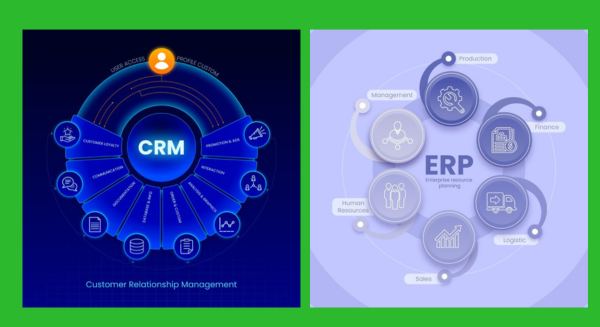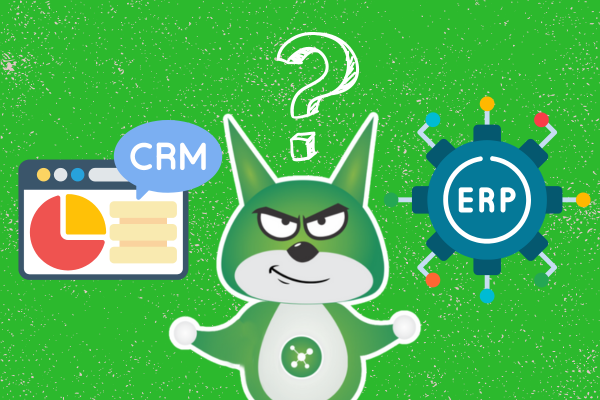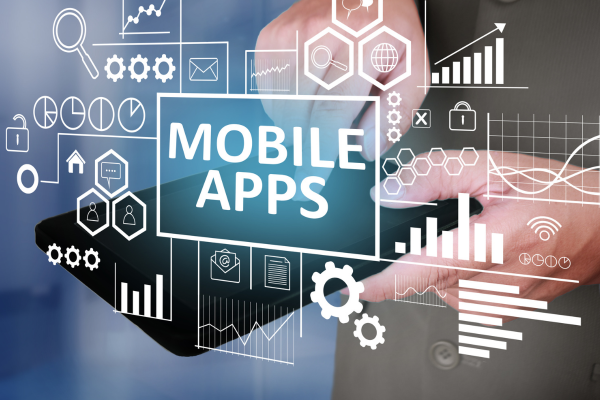ERP and CRM are recognized as two powerful tools supporting business development. These two terms are often mentioned together, causing many to feel vague and confused about their distinct roles.
To help businesses better understand ERP and CRM and choose the most suitable solution, this article will clearly explain “What is ERP? What is CRM? And the 5 key differences between ERP and CRM.” Let’s explore this together with Halink Software!
What are ERP and CRM?
-
What is ERP?
ERP (Enterprise Resource Planning), or enterprise resource planning, is a software solution that supports a business’s resource planning process. It helps manage the entire enterprise comprehensively.
- Functions of ERP: Integrates and automates business operations, from finance and human resources to production and logistics. It optimizes processes, reduces costs, and increases productivity and operational efficiency.
=> Learn more about ERP

-
What is CRM?
CRM (Customer Relationship Management), or customer relationship management, is a software solution for managing the relationship between customers and a business. It helps businesses improve relationships with existing customers, acquire new customers, and boost sales.
- Functions of CRM: Collects and analyzes data from interactions between the business and its customers. This includes sales, marketing, customer support activities, etc. From this data, businesses can grasp customer needs and propose suitable solutions to build sustainable customer relationships and increase sales.
=> Learn more about CRM

Similarities Between ERP and CRM
It’s not by chance that ERP and CRM systems are often mentioned together, leading to confusion. Overall, ERP and CRM share several significant similarities:
-
-
- Both play a crucial role in supporting enterprise management.
- Both have process automation capabilities, helping businesses automate repetitive tasks, reduce manual errors, and improve work efficiency.
- Both rely on collecting, storing, and analyzing data to support business decision-making.
-

5 key differences between ERP and CRM systems
While both ERP and CRM systems ultimately aim to increase profitability, fundamentally, these two systems have many key differences:
1. Objective:
-
-
-
- ERP: Enhances profitability by optimizing resources to reduce costs and improve operational efficiency.
- CRM: Drives sales, increases revenue, and boosts profits by effectively managing customer relationships.
-
-
2. Scope and Function:
-
-
-
- ERP: Manages all overarching operations within the enterprise: from HR, finance-accounting, to production, sales, inventory management, etc.
- CRM: Manages only activities related to the relationship between the business and its customers, such as: managing sales operations, marketing, customer service, etc.
-
-
3. Management Focus:
-
-
-
- ERP: Manages all departments and the entire organizational structure of the enterprise, including: Accounting – Finance, Human Resources, Projects, Production, Marketing, etc.
- CRM: Focuses on departments that interact with customers, such as: Sales, Marketing, Customer Service departments, and departments involved in collecting customer information and data.
-
-

4. Database:
-
-
-
- ERP: Stores diverse and specific data related to the business’s operational activities, such as: product information, raw materials, production plans, financial data, HR information, etc. This data is consolidated from various departments during operations.
- CRM: Stores and manages information and data related to customers, such as: contact information, purchase history, preferences, shopping behavior, etc. This data is compiled from interactions between customers and the business.
-
-
5. Enterprise Size and Cost:
-
-
-
- ERP: Typically used in enterprises with many departments and requiring complex management processes. It’s usually larger in scale and incurs more costs than CRM.
- CRM: Used in many businesses, both large and small, due to its lightweight nature. It’s generally less complex and costs less than ERP.
-
-
Should You Choose ERP or CRM for Optimal Business Efficiency?
It’s not accurate to say whether ERP or CRM is inherently “better” because, fundamentally, these two software systems handle different functions, both ultimately aiming to increase profitability. Therefore, for businesses looking to standardize their operational processes using technology from the outset, it’s often advisable to integrate both ERP and CRM.
However, if your business lacks the resources to implement both simultaneously, you should consider the following factors to make an appropriate decision:
-
-
-
- Business Operations: If your business’s profitability relies more on customer relationships than on operational processes, CRM might be the better choice. Conversely, if internal process optimization is key, consider ERP.
- Scale: CRM is suitable for most businesses involved in sales and commerce, regardless of size. ERP is more optimized for medium to large enterprises with multiple departments and complex management processes.
- Development Stage: In the early stages, CRM will effectively support businesses in building strong customer relationships and establishing a market reputation. As the business grows, and the number of departments and personnel increases, ERP will help reduce operational costs through centralized management and process automation.
- Budget: Generally, CRM will require less budget than ERP, making it suitable for most businesses.
-
-

Additionally, to ensure both systems operate effectively and cost-efficiently, it’s crucial to choose a suitable design and development partner. Halink Software, with over 10 years of experience in software design, custom software development, and successfully developing CRM and ERP systems for numerous businesses, can assist you.. For a more detailed consultation on designing ERP and CRM systems, please contact Halink Software at our toll-free hotline 1800 6319 for the best advice and a quote




